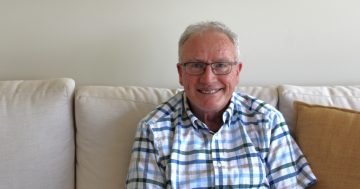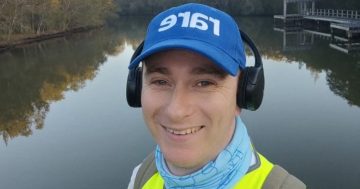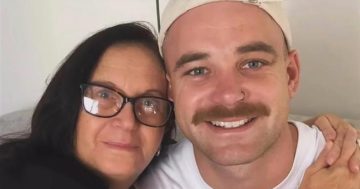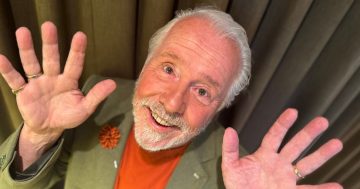
Graham Lancaster is determined to tackle ALS head-on. Photos: Supplied.
As a lawyer, Graham Lancaster is accustomed to fighting battles in a court of law.
The well-known Illawarra lawyer is the chair of The Illawarra Connection, a tireless supporter of charities and is easily recognisable at his beloved Illawarra Hawks basketball games with his signature black-and-red horned helmet.
Yet, the much-loved and colourful character is now faced with the toughest challenge of his life: a diagnosis of the fatal motor neuron disease amyotrophic lateral sclerosis (ALS).
In his first in-depth interview about the diagnosis, he responds to an opening, heartfelt offer of concern and distress from the interviewer with: “Better me than someone else”.
Typical. Staying true to his character, Graham remains both pragmatic and positive, determined to face the challenges ahead with resilience.
Medical experts, and the internet, have told him the average life expectancy is three to five years after diagnosis, but Graham is encouraged instead by one of ALS’s best-known identities, English theoretical physicist Stephen Hawking.
“So far as this disease goes, it’s not a great disease, but I am encouraged by the fact that Stephen Hawking had it from the age of 21 until he died at age 76,” he said.
“I’m also encouraged by other people I’ve seen that have gone through it. I’ve read Professor Justin Yerbury’s book Fighting Fate, and I’ve been able to draw some strength from that as well.
“If there was a universe where it picks me rather than somebody else, I’ve got a better chance, I think, of prolonging my life, and maybe even helping people with this disease, either through trials, contributing to a cure, through lifestyle changes extending their life, or through advocacy trying to get more research funding and greater interest.”
It was in March that Graham found himself unable to pick up the barbell at the gym, no longer able to sign documents or do up the top button on his shirt.
The weakening grip in his right hand led him to seek medical help, resulting in being diagnosed in June with ALS.
“I went to an acupuncturist, and she observed there was wasting of the muscles between the thumb and first finger on the right hand,” he said.
“I went to the doctor and we were talking about a potential issue with a nerve in the neck because I have a bit of stenosis up in C4-C6 and C7-T1.
“I was going to go get it operated on, or so I thought, but I got a referral to a neurologist for nerve conduction studies to be sure.”
Not able to see that neurologist for more than three months, he rang around until he could find one who he was able to see the following week.
“He did the nerve conduction study and wrote me a report that said, ‘This guy needs to have a prompt formal neurological examination, but my books are full’,” Graham said.
“I then had the neurosurgeon coming up – he was the one I was going to go to for an operation – and he sent me off for an MRI of the brain, which came back clear, so that ruled out MS.”
A referral to neurologist Professor Matthew Kiernan had him on a three-month waitlist, while securing a second referral to Professor Steve Vucic had him on a three-and-a-half-month waitlist.
“I went, ‘Wow, no wonder people die’. I then got into a cancellation appointment with Dr Kiernan, and as I arrived in his rooms, Dr Vucic’s rooms rang and said, ‘I’ve got a cancellation as well’,” Graham said, referencing a clear sudden urgency.

Graham is taking part in the Lift the Load Challenge.
The challenge was then sharing the diagnosis with family.
“[Wife] Cath has been pretty good. Some of the family have cried, but Cath didn’t let me see her crying,” he said.
“My reaction was, ‘OK, this will be a challenge’. I thought, well, if the average is three to five years, I’m above average.
“Provided I can keep going until retirement age, which I’m 57 now, so if I can make it through to my mid to late 60s, I’d be happy, because I intend to keep on working.”
He said one positive note was that of the two versions of ALS – genetic and sporadic – tests had confirmed he didn’t have genetic, which was good news for the family.
“However, doctors can’t tell you what causes it. Sporadic cases still remain unexplained, although the suggestion is potentially some level of toxicity,” he said.
“What that might be, there’s a lot of speculation. It could be anything from medications to environmental factors, or glyphosate in the environment, with all our processed foods.”
Last week, Graham started a trial for the drug Ambroxol, which doctors hope will prove to be neuroprotective and slow progression of the illness.
“Obviously, I’m happy that I’ve caught it early, because it often takes up to two years to get diagnosed, at which stage progression has occurred,” he said.
“I’ve been on Rilozule since July and getting onto the Rilozule early has been comforting, because it’s supposed to extend life expectancy by three to six months in advanced cases, but if you get it early enough, it could be 18 months to two years.
“What the internet says about the average life expectancy is something I’m hoping to beat by reason of my younger age, getting onto it early and starting to get treated.
“I’m also fairly hopeful that advances in medicine might occur in the next few years.”
Graham said while it wasn’t curable, some diagnosed with ALS had seen improvements in their condition or “reversals”, but it was rare.
For now, Graham has seen positive change since starting medication.
“I have improved my grip strength over the last two months and have been able to return to writing and signing my name,” he said.
“I can also pull wheeled bags and lift small weights with my right hand and so I am hopeful that there is a sign of improvement.”
He said he now took supplements, had cleaned up his diet and maintained his exercise regimen, which this month had included being involved in Top Blokes Foundation’s Lift the Load Challenge for Mental Health Month through charity team Illawarra All Stars.
The challenge involves carrying around a 10 kg weighted vest while walking 50 km over October. It is encouraging men to lift the heavy mental burden they carry each day by talking about their mental health struggles while raising money towards Top Blokes’ youth mentoring programs.
Graham’s also involved in several charities to raise awareness for campaigns and has never been afraid to put himself out there, no matter how it makes him look.
“Some people say I look silly, some people smile,” he said.
“We can’t take ourselves too seriously, because ultimately, we all die. I came to terms with the concept of my mortality many years ago.
“I’ve long held as a mantra the poem If by Rudyard Kipling, and I’ve got that up in the office. I read through it anytime there’s trouble.
“It addresses many aspects of life and is great life advice.
“The final verse is, ‘If you can fill the unforgiving minute, With sixty seconds’ worth of distance run, Yours is the Earth and everything that’s in it, And — which is more — you’ll be a Man, my son!’
“So, my ambition is to fill the unforgiving minute with 60 seconds worth of distance run.”
You can support Graham in the Lift the Load Challenge.


















